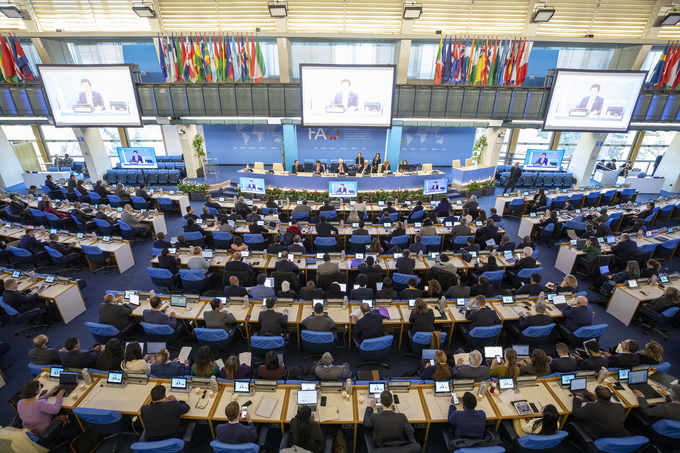October 12, 2025 | 11:46 GMT +7
October 12, 2025 | 11:46 GMT +7
Hotline: 0913.378.918
October 12, 2025 | 11:46 GMT +7
Hotline: 0913.378.918

Opening of the 176th Session of FAO Council.
With the approach of the Organization’s 80th Anniversary, QU Dongyu, Director-General of the Food and Agriculture Organization of the United Nations (FAO) renewed his call to make the Organization more efficient, more effective and more coherent with “even more meaningful, transparent and visionary guidance” in pursuit of agreed strategies for the decades ahead.
FAO’s goal is to be fit for purpose within the “ever-evolving global development agenda” and to ensure that “our children and our grandchildren will reap the benefits of the seeds we plant today,” Qu said in remarks opening the 176th Session of the FAO Council, being held in Rome this week.
He urged Members to make sure that FAO plays its “rightful role as a leader in galvanizing collective efforts for a better world and a better future for humanity as collectively agreed by the “Pact for the Future” at the UN Summit of the Future in September.
The FAO Council is the executive organ of the FAO Conference, and its sessions can be followed by webcast. The full speech of the Director-General’s opening remarks can be accessed here.
“The world’s hungry, the world’s farmers, the world’s consumers, they all rely on us to fulfil their vision of a better world,” and it is FAO’s noble mission to support its Members transform global agrifood systems to be more efficient, more inclusive, more resilient and more sustainable, he said.
FAO’s mandate has become ever more urgent in view of the increase in the global prevalence of undernourishment, which now estimates around 733 million people, or one of every 11, faced hunger in 2023.
Highlights
The Director-General’s Council-opening speech highlighted a number of FAO actions, initiatives and achievements, including effective contributions to major international fora such as the G7 and the Asia-Pacific Economic Cooperation (APEC), as well as the G20, which in November launched the Global Alliance Against Hunger and Poverty, for which FAO will host the Alliance’s Support Mechanism.
Qu highlighted that FAO drives economic cooperation within these important multilateral fora, among many others.
Qu hailed FAO staff and global leaders for contributing to make FAO more visible globally, as evidenced by greater attention on the role of agrifood systems in addressing and providing the solutions for the climate crisis in recent COP summits on biodiversity, the climate and desertification.
The Director-General himself has held more than 250 bilateral meetings and since June has traveled to 21 countries and undertaken 60 field visits in his campaign to make sure FAO and its implementing partners move from vision to action, and to promote global convergence on the Four Betters: better production, better nutrition, a better environment and a better life – leaving no one behind.
Qu also noted that the new Atoms4Food Initiative, part of a long-running and successful partnership with the International Atomic Energy Agency, is now working to serve requests from nine countries. He also hailed the flagship Globally Important Agricultural Heritage Systems (GIAHS) programme, which has recognized 89 sites around the world and is aiming to reach 100 next year.
The Director-General also noted the increasing benefits of investments in South-South and Triangular Cooperation, especially at the country level, and stated there was great potential to utilize and scale up this cooperation further “with more partners and in more countries”.
FAO is also galvanizing global efforts to promote dietary diversity and continues to strengthen its benchmark work on data and statistics, as well as developing an Artificial Intelligence chatbot interface.
Qu emphasized that FAO continues to be committed to interventions in emergencies in hunger hotspots where it is foreseen that acute food insecurity could increase to the highest level, including in Palestine, Sudan, South Sudan, Haiti and Mali.Such work and more are in line with the FAO Strategic Framework 2022-31.
(FAO)

(VAN) The people who are most vulnerable to the hard-to-breathe air that comes with climate change may inadvertently be adding to the problem, new research finds.

(VAN) Director-General QU Dongyu announces series of initiatives following global livestock conference.

(VAN) China’s freeze on U.S. soybean purchases hits a key GOP constituency in the run-up to 2026 midterm elections.

(VAN) President Xi Jinping's festive greetings ahead of the eighth Chinese Farmers' Harvest Festival, which fell on Tuesday this year, were a clear signal that China regards food security as a core strategic issue.

(VAN) BBNJ Agreement will enter into force in January.

(VAN) Demonstrations have been planned around the world this week ahead of the United Nations General Assembly and New York Climate Week.

(VAN) After years of intense deliberation, the European Commission has finally given its nod to the Mercosur and Mexico agreement.